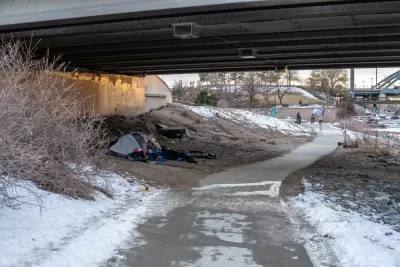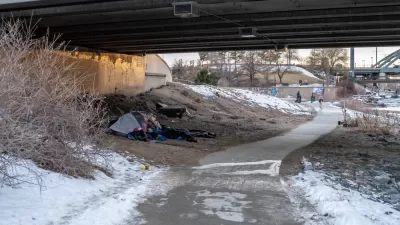Denver's "Right to Survive" initiative highlights just how troubling and problematic policy approaches to homelessness can be.

J. Brian Charles reports: "On Tuesday, Denver voters were the first in the country to weigh in on whether homeless people should have what supporters say is the "right to survive." They responded with an overwhelmingly no."
Ballot Initiative 300 would have ended a citywide ban on camping and wearing a blanket, "effectively criminalizing homeless people who live in tents and on the streets," according to Charles.
According to Charles, Initiative 300 was a result of the September 2018 ruling in the 9th Circuit U.S. Court of Appeals overturning a Boise law that banned sleeping in public spaces as "cruel and unusual punishment."
The "right to survive" initiative failed to win support from some homeless advocates as well as the city agency working to reduce homelessness in the city. "Its director, Chris Conner, argued that eliminating the ban would cut some homeless people off from services they need. Under the ban, police are required to connect homeless people they encounter with social services. They only issue a ticket or make an arrest if the person refuses services or refuses to move," explains Charles.
"But Denver Homeless Out Loud, which gathered the signatures to put Initiative 300 on the ballot, objected to the idea that the ban reduces homelessness. It merely moves homeless people out of sight and out of mind."
FULL STORY: Denver Voters Deny Homeless the 'Right to Survive.' Here's What That Means.

Planetizen Federal Action Tracker
A weekly monitor of how Trump’s orders and actions are impacting planners and planning in America.

Maui's Vacation Rental Debate Turns Ugly
Verbal attacks, misinformation campaigns and fistfights plague a high-stakes debate to convert thousands of vacation rentals into long-term housing.

Restaurant Patios Were a Pandemic Win — Why Were They so Hard to Keep?
Social distancing requirements and changes in travel patterns prompted cities to pilot new uses for street and sidewalk space. Then it got complicated.

In California Battle of Housing vs. Environment, Housing Just Won
A new state law significantly limits the power of CEQA, an environmental review law that served as a powerful tool for blocking new development.

Boulder Eliminates Parking Minimums Citywide
Officials estimate the cost of building a single underground parking space at up to $100,000.

Orange County, Florida Adopts Largest US “Sprawl Repair” Code
The ‘Orange Code’ seeks to rectify decades of sprawl-inducing, car-oriented development.
Urban Design for Planners 1: Software Tools
This six-course series explores essential urban design concepts using open source software and equips planners with the tools they need to participate fully in the urban design process.
Planning for Universal Design
Learn the tools for implementing Universal Design in planning regulations.
Heyer Gruel & Associates PA
JM Goldson LLC
Custer County Colorado
City of Camden Redevelopment Agency
City of Astoria
Transportation Research & Education Center (TREC) at Portland State University
Jefferson Parish Government
Camden Redevelopment Agency
City of Claremont





























